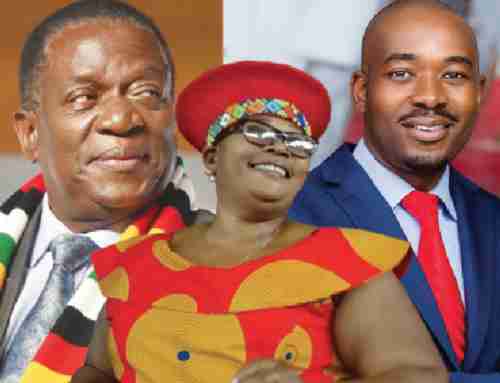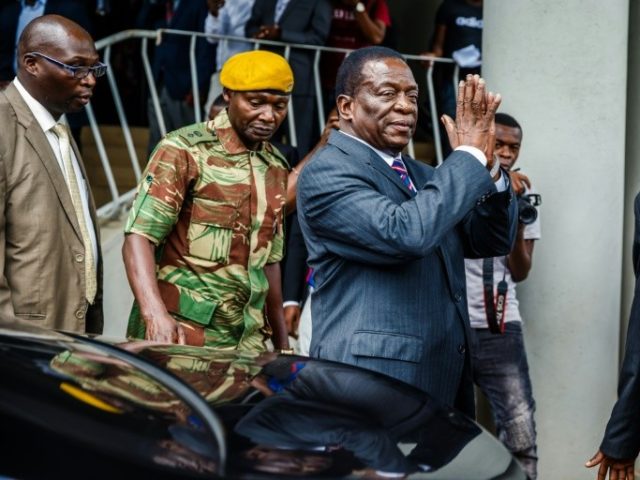This morning’s key headlines from GenerationalDynamics.com
- Zimbabwe president Mnangagwa blames Grace Mugabe for bomb blast at rally
- Zimbabwe elections overshadowed by the country’s dark past
Zimbabwe president Mnangagwa blames Grace Mugabe for bomb blast at rally

Three presidential candidates (L to R): Emmerson Mnangagwa, Joice Mujuru, Nelson Chamisa (Independent-zw)
Zimbabwe’s President Emmerson Mnangagwa is blaming a political group linked to Grace Mugabe, the wife of former president Robert Mugabe, for a bomb explosion that occurred last Saturday (June 23) during a Mnangagwa rally, killing two and injuring dozens. The obvious target was Mnangagwa, but he escaped unharmed.
Fearing a new terror attack on Wednesday, Mnangagwa canceled a rally scheduled for Wednesday, his first campaign rally since the attack on Saturday.
Wednesday’s rally took place without him. It was in the city of Hwange, which is an opposition stronghold, like Bulawayo, which is where Saturday’s attack occurred.
Although Mnangagwa did not directly accuse Grace Mugabe of being in involved in Saturday’s bombing, he accused the Generation 40 (G40) group of Grace Mugabe supporters of being behind the bombing. The G40 group is a group of younger members of Mnangagwa’s and Mugabe’s Zanu-pf political party. Grace Mugabe is 52 years old, while her husband Robert Mugabe is 94.
A former member of the G40 group, former government minister Jonathan Moyo, said that the explosion “smacks of an inside job.”
The implication is that the Mnangagwa election team staged the explosion in order to justify a crackdown on the opposition prior to next month’s general elections, scheduled for July 30. It seems unlikely that the bombing was an inside job, however, because of the large number of casualties.
Even so, there is a widespread suspicion that Mnangagwa will use the explosion as an excuse for security crackdowns that will guarantee the election of him and his Zanu-pf party. Under Robert Mugabe, extreme violence was used for decades to keep Zanu-pf in power.
Opposition leader Nelson Chamisa, head of the opposition party Movement for Democratic Change (MDC), has directly suffered election-related violence under the Mugabe regime. He said on Wednesday:
It shows you that things can turn ugly, it has been ugly in the past and over the past 38 years we have had disputed elections, violent elections, state-sponsored violence and we are likely to see that ugly feature rearing its head once more.
Zimbabweans are vulnerable … the electorate is vulnerable, political players like myself are vulnerable. I have scars on account of political violence in the past, so it’s something we have budgeted for.
However, Mnangagwa is trying to reassure the international community that Zimbabwe has changed, and that it is once again a good idea for foreign investors to invest in Zimbabwe. In particular, he has promised that the election will be free and fair, and open to international observers. He has invited election observers from the United States, the European Union and elsewhere for the first time in 16 years. Mugabe rejected Western observers, accusing them of bias.
In order to reassure both voters and foreign investors, all 23 presidential candidates running in the July 30 elections signed a “peace pledge” on Wednesday committing themselves and their political parties to a peaceful campaign ahead of the elections. BBC and Herald (Zimbabwe) and Reuters and Guardian (London) and AP
Zimbabwe elections overshadowed by the country’s dark past
During last year’s chaos in Zimbabwe’s capital city Harare, president Robert Mugabe fired his vice-president, Emmerson Mnangagwa, so that Grace Mugabe could succeed him. This triggered a series of events that led to the forced resignation of Mugabe and his replacement with Mnangagwa as the new president.
There was a great deal of vitriolic hostility between the two men last year, and it was joined by Mugabe’s wife Grace Mugabe, who blamed Mnangagwa for her husband’s downfall.
However, the vitriol was only recent, since the two men worked closely together since independence in 1981.
They are both in the Shona tribe, and they both are responsible for Operation Gukurahundi, the genocidal war crime that brought in North Korean soldiers to help exterminate tens of thousands of civilians in the hated Ndebele tribe in the early 1980s.
They have both cooperated in turning Zimbabwe into a police state, where anyone who speaks against the government was likely to be arrested, tortured and killed. This is particularly true of the members of the Ndebele tribe that managed to survive Operation Gukurahundi.
They both worked together on Mugabe’s “indigenization” program, which threw out farm and business owners who knew how to run a farm or a business, and replaced them with thugs and cronies from Mugabe’s and Mnangagwa’s Shona tribe who did not know how to run a farm or business. Over three decades, Mugabe and Mnangagwa turned Rhodesia, which was a wealthy country and the breadbasket of southern Africa, into today’s Zimbabwe, which is an economic basket case.
Mnangagwa is now trying to convince foreigners to invest in Zimbabwe again. In order to do that, he is going to have to convince investors that Operation Gukurahundi and indigenization are in the past, and will not be repeated in the future so that investors’ money will be safe. This is going to be a tough sell for Mnangagwa, since there are still a lot of people in Zimbabwe, especially people in the Nbdele tribe, that believe that there is continuing violent discrimination against people in the Nbdele tribe, and that Mnangagwa will not hesitate to use “indigenization” to confiscate a farm or a business to aware to one of his Shona cronies in return for political favor. The Zimbabawean and Al Jazeera and Independent (Zimbabwe)
Related Articles
- Thanksgiving euphoria in Zimbabwe as Emmerson Mnangagwa replaces Robert Mugabe (23-Nov-2017)
- Zimbabwe bans food imports as new ‘bond note’ currency crashes (21-Oct-2017)
- Zimbabwe, Venezuela, Puerto Rico – three amigos in Marxist economic destruction (01-Jul-2016)
- Zimbabwe’s 90 year old ‘Liberation Hero’ Robert Mugabe wins another election (04-Aug-2013)
- ‘Liberation Hero’ Robert Mugabe now destroys Zimbabwe with cholera (08-Dec-2008)
- Zimbabwe’s ‘Liberation Hero’ president Robert Mugabe continues to destroy his country (04-May-2008)
KEYS: Generational Dynamics, Zimbabwe, Emmerson Mnangagwa, Zanu-pf, Shona, Nelson Chamisa, Movement for Democratic Change, MDC, Nbdele, Generation 40, G40, Jonathan Moyo, Robert Mugabe, Grace Mugabe, Operation Gukurahundi, indigenization
Permanent web link to this article
Receive daily World View columns by e-mail

COMMENTS
Please let us know if you're having issues with commenting.